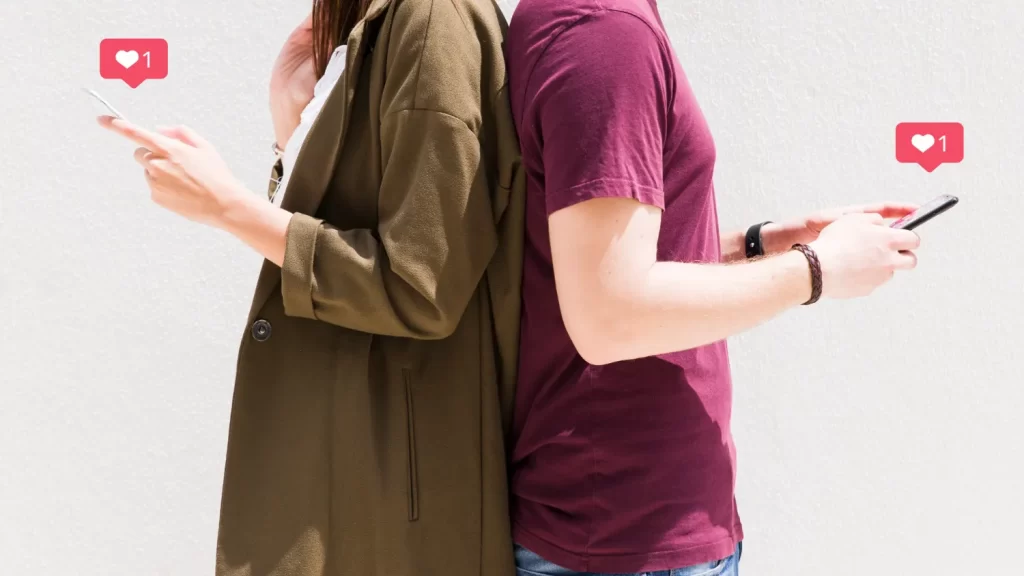Dating and Relationships in the Digital Age
Current data reveals specific patterns in how social media impacts dating and relationships. Among partnered Americans aged 50 and older, 41% report that their partner often gets distracted by their cell phone during conversations. Additionally, 34% of partnered adults have checked their partner’s cell phone without their knowledge, with women (42%) being more likely than men (25%) to do so.
Social media usage among couples also shows significant trends: 81% of users notice others posting about their relationships, with 46% observing this frequently. This trend extends to actions such as checking up on former partners, which 53% of users admit to doing.
User interactions on social media further demonstrate its role in relationships. Approximately 28% use social media to share or discuss relationship matters. However, the platform also induces feelings of jealousy or uncertainty among 23% of users who feel influenced by their partner’s online interactions.
This sentiment is particularly pronounced among those aged 18 to 29, where 34% report such feelings.
The Positive and Negative Effects of Social Media on Relationships
Social media yields both positive and negative outcomes in relationships. On the positive side, it enables partners to publicly express affection and share mutual information, enhancing connectedness, especially in long-distance relationships. Moreover, social media platforms offer singles avenues to connect through online dating sites and groups. It also provides access to relationship advice, though users must verify the credibility of the information.
Conversely, social media can detract from quality time between partners. It may facilitate negative comparisons with others, diminishing relationship satisfaction. The larger the role social media assumes, the less satisfying romantic relationships tend to be. Missed opportunities for connection are another adverse effect, as partners distracted by social media may fail to engage meaningfully with each other.
Teens and Social Media in Romantic Relationships

Teenagers exhibit varied responses to the influence of social media on their romantic relationships. A significant 59% say social media helps them stay connected with their partner’s activities. Additionally, 47% regard social media as a platform to show their care, while 44% feel it brings emotional closeness.
However, 27% report feelings of jealousy or insecurity about their relationships due to social media interactions. Gender differences also emerge, with boys more likely than girls to use social media for both emotional and logistical connection.
Furthermore, a study examining the impact of social network site intrusion (SNSI) on relationship satisfaction found a negative correlation. Administered to 100 students at a faith-based university in the southern United States, this study utilized the Social Network Site Intrusion Questionnaire (SNSIQ) and a relational satisfaction survey.
The findings rejected the null hypothesis, underscoring the negative influence of social media use on relationship satisfaction.
Also Read: Surviving Quarantine 101: Tips for Being Stuck at Home
Modern Relationships and Social Media
Overall, social media can be a tool for connection and conflict within modern romantic relationships. Public displays of affection on social platforms and mutual information sharing are examples of how they foster connection. Long-distance couples can maintain closeness through these interactions.
However, the drawbacks include reduced quality time and increased jealousy from interactions such as thirst traps, which depict attraction and attention on social platforms. This phenomenon, alongside comparisons with others, can detract from relationship satisfaction.
Issues of jealousy and insecurity are prevalent among social media users. For instance, among partnered individuals, 23% have felt unsure about their relationship due to their partner’s social media interactions. Among younger users aged 18 to 29, the percentage rises to 34%. Notably, the act of monitoring past relationships via social media is common, with 53% of users engaging in this behavior.
In conclusion, while social media provides opportunities for connection and access to relationship advice, it can also instigate intrusive behaviors and negative feelings, particularly within romantic contexts. Examining these patterns provides insight into the nuanced role of social media in shaping modern relationships.

